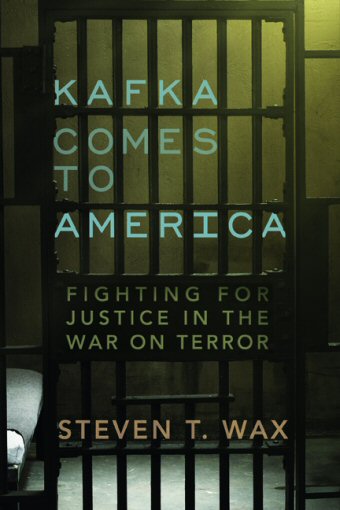
In Kafka Comes to America, Steven T. Wax -- the long-time Federal Public Defender for Oregon -- recounts his experience representing two clients, Brandon Mayfield and Adel Hamad.
Mayfield was a youngish attorney starting a practice in Beaverton, OR. Then he was suddenly in the international news, arrested as a material witness in the Madrid train station bombings, with leaks from the government indicating that his fingerprint matched one found on a bag of explosives. Much later, it was revealed that the Spanish National Police never agreed with the FBI's identification and in fact eventually matched the print to an Algerian suspect. By the way, it appears that the FBI focused on Mayfield largely because he was a Muslim married to an Egyptian-American.
Hamad was one of several Guantánamo detainee's Wax's office represented. Sudanese, he had spent years working for relief organizations in Pakistan and Afghanistan: he taught school in a refugee camp and he was a hospital administrator. One day Pakistani police -- along with someone with an American accent -- picked him up in his apartment in July 2002. He was questioned (again and again) in a prison in Pakistan, suffering physically to the point that his captors hospitalized him, and then in March 2003 questioning and rough treatment in the Middle East, he was flown to Guantánamo. Two years later, after Rasul v. Bush, 542 U.S. 466, Findlaw (2004) the Army notified detainees that they could petition for habeas corpus and, in March 2005, Hamad handwrote his petition. It was in February 2006 that he first met his lawyer. In December 2007, he finally returned home. He still hopes to have a hearing that will declare that he never was an enemy combatant.
The book presents a good picture of the multi-faceted advocacy Hamad's team presented -- administrative, judicial, political. They interviewed his family and colleagues in Sudan, Pakistan, and Afghanistan. They met with high-ranking Sudanese government officials (and they often couldn't get their calls to U.S. officials returned). One way they increased awareness of his situation was through videos on YouTube, first Guantánamo Unclassified (narrated by one of the public defender investigators):
and then Guantánamo: Waiting for Justice (introduced by Martin Sheen):
For more, visit projecthamad.org.
The book will be available in the library in a couple of days.
Sunday, July 20, 2008
Kafka Comes to America: Fighting for Justice in the War on Terror
Subscribe to:
Post Comments (Atom)

No comments:
Post a Comment